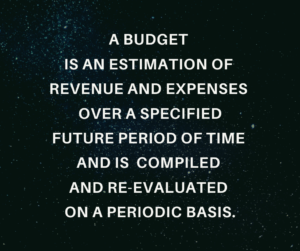Why should your business set a budget?
Time and money are the most valued resources for all individuals and organizations. Efficient and effective use of these resources requires planning and sometimes creativity, especially if you are starting out or are a small business.
Planning on how to use your time and money in your business alone is not enough, as you and I already know. Best intentions not always result in actions and sticking to the plan. That’s where we need control to ensure that plans are carried out.
That’s where a budget really helps.
A budget is a tool that managers use to plan and control the use of scarce resources. A budget is a plan showing the company’s objectives and how management intends to acquire and use resources to attain those objectives.
Budgeting is the process of creating a plan to spend your money. It is a financial plan for the future concerning the revenues and costs of a business. However, a budget is about much more than just financial numbers.
 Budget for Business:
Budget for Business:
Budgets are an integral part of running any business efficiently and effectively.
Once a business is established, budgeting becomes a regular task that normally occurs on a quarterly and/or annual basis, where the past quarter or year’s budget is reviewed, and budget projections are made for the next three or even five quarters or years. The basic process of planning a budget involves listing the business’s fixed and variable costs on a monthly basis and then deciding on the allocation of funds to reflect the business’s goals.
Businesses often use special types of budgets to assess specific areas of operation. A cash flow budget, for instance, projects your business’s cash inflows and outflows over a certain period of time. Its main use is to predict your business’s ability to take in more cash than it pays out.
Why Does Your Business Need a Budget?
Without a budget, you may not know how your business is performing. A budget provides an accurate picture of expenditures and revenues and should drive important business decisions such as whether to:
- Increase marketing
- Cut expenses
- Hire staff
- Purchase equipment
- Improve efficiencies in other ways
A comprehensive budget will also be a definite requirement for obtaining business loans from financial institutions or seeking equity funding from investors.
Budgeting is always helpful since it helps you to track revenue and expenses and manage cash flow. But creating a budget that does nothing more than set spending limits can damage a small business by preventing it from reacting to market conditions. A flexible budget helps you to adjust spending, increase marketing to expand sales, react to an unexpected drop in revenues and otherwise operate your company using real-time data to keep it on track.
Planning
A budget is a planning tool necessary for building a framework for your business and its finances. Combining past trends with realistic forecasts for the year, a budget provides a detailed view of assets, realistic revenue expectations, and how those balance against your anticipated expenses.
Budgets also help with setting goals and establishing priorities. A budget should detail where funding will come from to execute new strategies and how much revenue can be generated by executing the strategies successfully. The line items that command the most funding or generate the most revenue typically are high-priority items, and that can serve as a good reminder of your overall strategy when making decisions.
Evaluation
In addition to being an important part of the planning process, budgets are necessary for evaluating the performance of your company over the course of the year. Part of budgeting responsibly is tracking actual revenue and expenses and comparing them to what was budgeted. This helps to assure that your business is sticking to its plans but budgeting also offers an important means of identifying problems and opportunities.
Financing
A history of writing sound, detailed budgets and sticking to them can help show lenders or potential investors that you know how to develop a business plan and make it work. Lenders and investors certainly will want to dig much more deeply into your finances and history, but if they don’t see evidence of strong budgeting practices, that might be enough of a red flag to turn them away.
If you are opening a new business and have little or no history, you need to make up for that lack of track record with detailed support for your budget. This means doing research into the marketplace and showing how past trends or perhaps a void in the industry supports the numbers you are presenting. This kind of attention to detail can help you gain serious consideration from lenders or investors.
Benefits of a business budget:
There are a number of benefits of drawing up a business budget, including being better able to:
- Manage your money effectively
- Allocate appropriate resources to projects
- Monitor performance
- Meet your objectives
- Improve decision-making
- Identify problems before they occur – such as the need to raise finance or cash flow difficulties
- Plan for the future
- Increase staff motivation
Budgeting in a business has benefits and consequences that go beyond the financial dimension and have more to do with business management in general.
Consider the following additional benefits of a budgeting process:
- Budgeting forces managers to do better forecasting. Managers should be constantly checking the business environment to spot changes that will impact the business. Vague generalizations about what the future may hold for the business are not good enough for building a budget. Managers must put their predictions into definite and concrete forecasts.
- Budgeting motivates managers and employees by providing useful measures for evaluating performance. The budgeting process can have a good motivational impact by involving managers in the budgeting process and by providing incentives to managers to strive for and achieve the business’s goals and objectives.
- Budgeting can assist in the communication between different levels of management. Putting plans and expectations in black and white minimizes confusion and creates a common language. Well-crafted budgets can undeniably help the communication process.
- Budgeting is essential in writing a business plan. New businesses need to present a convincing business plan when raising capital. Because these businesses may have little or no history, the owners must demonstrate convincingly that the company has a clear strategy and a realistic plan to make profit. A clear, realistic budget forecast is an essential part of a business plan.
Creating a business budget will make operating your business easier and more efficient. A business budget can also help to make sure that you’re spending money in the right places and at the right time to stay out of debt. Cloudit Bookkeeping can help you put your budget in place and assist you with planning and re-evaluating your forecasts. Get in touch with us to find out more.



